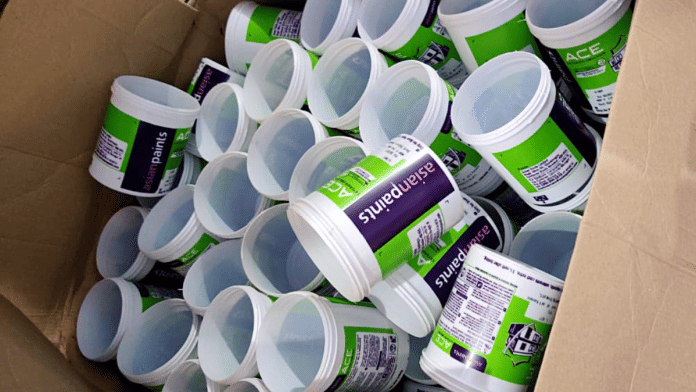New Delhi: In a significant ruling that is set to strengthen corporate rights in criminal cases, the Supreme Court has ruled that companies aggrieved by the loss incurred to them due to someone’s criminal conduct can challenge their acquittal or seek enhancement of the sentence.
“We find that this is not a very complicated issue of law. We do not propose to complicate it!” the court said in its 14 July ruling, allowing an Asian Paints plea against a Rajasthan High Court order of 2023.
The top court was hearing a case that stemmed from a 2016 incident in Rajasthan’s Tunga where a man was allegedly found selling counterfeit Asian Paints products. After his shop was thoroughly checked, 12 paint buckets bearing a mark similar to the Asian Paints’ logo were allegedly found.
This prompted the police to file an FIR against him for cheating and criminal conspiracy, under sections 420 and 120B of the Indian Penal Code.
Besides this, a complaint was also registered under sections 63 and 65 of the Copyright Act. The sections deal with infringement of a copyright and possession of plates intended for making infringing copies.
The company said they have been in the business of manufacturing paints and related products for the past 73 years, and of late several cases of people selling fake or counterfeit Asian Paints products have come to their notice.
The company gave its power of attorney to a person named Ajay Singh who had to track down, investigate and take action against unauthorised practices of infringement and passing off, among others.
In 2019, the additional chief metropolitan magistrate sentenced the seller to imprisonment along with a fine.
The man moved the first appellate court which set aside the trial court order and acquitted him in 2022.
Asian Paints then moved the Rajasthan High Court which rejected its plea in 2023, saying the company could not be a complainant under section 372 of the Code of Criminal Procedure (CrPC).
The company challenged the Rajasthan HC order in the Supreme Court which allowed the plea in its 14 July order, noting the court definition under criminal law has given an “expansive understanding” to the term ‘victim’ and not a narrow or restricted meaning.
Also Read: Johnson & Johnson granted Rs 3.34 crore in damages by HC, what was the counterfeit products case
Section 372 of CrPC
This section was inserted with the objective of conferring rights on the victims of any crime, since the law is couched in the belief that they are the worst sufferers in such incidents, and require rights and compassion. This section seeks to create a right in the victim’s favour in criminal cases.
It was amended in 2009 to include a proviso that in cases where the accused in a criminal case has been acquitted or set free, the victim has a right to file an appeal against the order.
Hearing the appeal, the SC said the only question it would decide was whether Asian Paints, a company, fell under the definition of “victim” under the proviso to Section 372 CrPc.
“The language employed by the proviso to Section 372 of the CrPC is unambiguous to the effect that ‘the victim shall have a right to prefer an appeal against any order passed by the Court acquitting the accused or convicting for a lesser offence or imposing inadequate compensation,” the SC said.
Interpreting Section 2(wa) of the CrPC—which defines a victim as “a person who has suffered any loss or injury caused by reason of the act or omission for which the accused person has been charged—the court said the definition under criminal law has given an “expansive understanding” to the term ‘victim’ and not a narrow or restricted meaning.
Undoubtedly, Asian Paints suffered due to the counterfeit or fake products being sold in their name, and would incur financial loss and reputational injury, the court said, and rejected the HC’s reasoning, saying that it had taken an extreme direction while Section 372 is an independent or self-centred provision.
Recalling the Supreme Court’s 2025 ruling in Mahabir vs State of Haryana case, the court said that Section 372 creates a right in the favour of a victim which did not exist earlier.
This right allows the victim “to prefer an appeal against any order passed by the court acquitting the accused or convicting for a lesser offence or imposing inadequate compensation”.
A plain reading of the statement of objects and reasons for introducing the proviso to Section 372 CrPC makes it clear that it wanted to confer certain rights on the victims.
“It has been noted therein that the victims are the worst sufferers in a crime, and they don’t have much role in the court proceedings. They need to be given certain rights and compensation, so that there is no distortion of the criminal justice system,” the court said.
(Edited by Ajeet Tiwari)
Also Read: Why Delhi HC protected Ratan Tata’s name as a ‘well-known trademark’ to bar unauthorised use







I’ve also got it done but not satisfied and confirmed that it’s original or duplicate colour